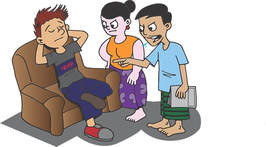|
Every school-aged child’s worst nightmare is that of being bullied. Not only are the physical and emotional impacts horrific, but the humiliation and powerlessness are profound. How can you be there for your child who may be a victim of bullying? “Hey Sweetheart,” Lauren cheerfully greeted her 10 year old daughter as she came in from school, “How was school today?” “Leave me alone. Nobody cares,” Grace huffed as she stomped by her mom and ran upstairs to her bedroom. Putting her dish towel down, Lauren thought, uh oh, here we go. She trailed her daughter up the stairs. “Aw, honey, what happened?” Grace burst into tears. Through her sobs she told her mom how Joey cornered her on the playground at recess. When she told him to leave her alone, he pushed her and called her a cuss word and a baby. Lauren active listened Grace’s feelings, hugged her, and helped her calm down. “Did you tell your teacher about this?” “Yes, right after recess. She ignored me and told me to get in my seat, that class was about to start.” I hope you haven’t experienced this scenario with your child. Unfortunately, such is all too common. Even with schools adopting anti-bullying policies, they are often not followed nor enforced. What to do. First, good for Lauren for giving Grace time to talk it out, to active listen her feelings, without adding her two cents. Calming your child and being there for her are your first priorities. Second, what’s with the teacher’s response? Clearly she did not take Grace’s words seriously. She was more focused on getting the class back to schoolwork---at Grace’s expense. Generally, bullies feel bigger and stronger than their victims. They tend to isolate victims from the group and intimidate by words and actions outside of earshot of others. In extreme examples, there might be extortion of lunch money or demanded servitude, like doing the bully’s homework for him. Male bullies are more often physical, while female bullies are more emotional in their antagonism, although either can be both. And so, more female bullies use the internet to harass and demean others. Such cyberbullying is a negative outcome of our age of technology. Male or female, physical, emotional, or cyber, all bullies have low self-esteem, feelings of inferiority, and are often victims of bullying themselves in an abusive family setting and feel left out of peer groups. Gang bullies, almost always male, have a primary, a sidekick, and 2-3 hangers on. As the parents, we are all prone to jump into action to defend our child. Please…take a breath and get all the details, while active listening and helping your child calm down. Children under 10 will probably be relieved that you take them seriously and are going to take care of it for them. Children older than 10 may see your involvement as intruding, potentially further embarrassing for them, and leading to more difficulty for them at school. Whatever your child’s age, when they are talked out and calmed, simply comment, “You know, sweetheart, I have some ideas about how we can nip this in the bud. Do you want to hear them?” With their consent, add, “If I were to get involved and come to your defense, this is what I would do.” Explain and get feedback, “What do you think?” When your child is a victim of bullying, brainstorm how they can keep it from happening again. Set boundaries. Stay within your group of friends. Change the context by becoming a positive influence on the bully. Tell teachers and authorities in private settings with a set of commitments from them and subsequent feedback. With older children, help them develop an effective plan. Note, fighting the bully is probably not a good option because of joint, multiple consequences. When your pre-teen/teen feels empowered and committed to following through on the plan, set a review meeting to de-brief and reinforce positive outcomes. Make sure he knows you have his back if he wants your direct help. Sometimes dealing with bullying is as hard for you as it is for your child. Use your active listening, joint problem-solving, and relational parenting to help him through his trauma/crisis.
0 Comments
 Why is it that our kids tend to see us as either the good parent or the bad parent? And what does that mean anyway? You know, all kids at one time or another, ask each parent separately, “Which one of us do you like the best?” Or, “Do you love me more than Joey?” Most parents respond some variation of, “I love you all the same.” Really? How does that effect your parenting? Are you the good parent or the bad parent? Five year old Mandy sulked in her time-out chair in the corner of the kitchen. Mama had put her there after she had thrown a tantrum, stomping her foot and declaring with attitude, “you don’t love me anymore.” All of this because she had gone into the pantry for cookies even though Mama had told her no and was busy making supper. Mandy’s daddy came into the kitchen, having just gotten home from a hard day at work. Mandy squealed in delight, from her time-out chair, as her daddy pecked her mama on the cheek. Before the parents could talk about the day’s events, Mandy bounded out of her chair toward her daddy, who scooped her up and whirled her around as she giggled. “Oh no you don’t,” cautioned her mama to her daddy. “Mandy’s in time out for now. She hasn’t talked to me yet about why she’s there, and she can’t get up until she has settled down and we talk about it.” “But I just got home and haven’t seen my baby girl all day,” her daddy protested. “Can’t Mandy just go back to time-out after we play a bit?” This scenario is a set-up for daddy to come off as the good parent and mama to be the bad parent. When these roles are consistent and secured, there’s trouble both for the marriage and for the family. As parents, you need to back each other up on matters of discipline. This avoids kids manipulating one parent against the other. You also need to find one-on-one fun time with each of your children, when there is no impending problem. You may connect with one child more than with another, but your time with each needs to be approximately equal. Good or bad parent? Each of you needs to embrace both roles at given times. It’s not an either/or. It’s a both/and. Then the marriage is secure and the children grow up “in the ways of the Lord…” (Proverbs 22:6).  Okay, I admit it. I’m a Star Trek nut. Never had the series theme song as my ringtone, but I do like the lead-in…Space, the final frontier. For teens, having space and learning how to navigate it well, is their final frontier, on the boundary between adolescence and adulthood. At 16, Alan was, well, Alan. He is tall, lanky, not particularly social nor athletic. He’s a computer gamer and he spends a lot of time in his bedroom watching YouTube videos and playing RPG’s with his friends. His role-playing friends are on-line. Each has the others back in the war games they play. Alan has only one friend in real life, his next door neighbor, Tommy, and they’ve known each other since they moved into the neighborhood when Tommy was 3 years old. Alan is a B/C student, doing well in computer, math, and technology classes at school, not so well in English and history classes. His thumbs fly when he is texting, of course using the obligatory texting, emoji-laden short hand, but it is hard for him to turn in essay questions, book reports, or even stories that capture his imagination and gaming expertise. His teachers have tried everything to help motivate Alan to succeed in school. So, the million dollar question. Is Alan’s story normal? Typical for his age group? As his parent, how do you check this out? How do you help him navigate to adulthood and successful, responsible, independent living? Alan certainly wants his space, his own cocoon in his room. That, in and of itself is normal. Teens do these kinds of things on their journey of finding themselves. Establishing an individual identity is the developmental goal of adolescence. However, we all, also by nature, are social animals. Most folks have 1 or 2 best friends, with whom each is the other’s confidante, and a social network of 6 to 8 people, 2 or 4 couples as adults, with whom they frequently hang out. To help the Alans of the world navigate adolescence to adulthood, several points come to mind. First, respect his need for space, but with some conditions. He must make an effort to emerge from his room for meals with the family, for school, and for other required appointments. Second, he must attend to responsibilities, such as homework, chores, errands and the like, before melting into his “space.” Third, he must be willing to share his feelings with you at some level. Remember, kids don’t answer essay questions very well. So, when you get a shoulder shrug, look away, or silence in response, make your essay question a multiple choice question. You know your teen well enough to likely come up with a topic or area that’s troubling him. Use your active listening to help him flesh out his feelings and be available, on his request, to troubleshoot and advise. Wanting space is not the teen problem. That’s normal. If they use that space to hole up, withdraw from social/family interaction, and push people away, then it’s a problem. With your kind assurance, healthy confrontation, and loving active listening, such problems can become teachable moments.  No surprise here. We live in the age of cyber-kids. Our kids have, or have access to, all kinds of electronic devices. Sometimes I ask my 6 year old granddaughter to help me out on my computer. You know what? She does. Not sure if that says more about her or me. Also, no surprise that advanced technology is a two-edged sword. It can greatly benefit our lives and our parenting. It also can be a distraction that erodes family relationships over time. When my wife and I go out to eat, often I casually check iPhone use among families in the restaurant. I have seen a family of 5 people all separately on their phones, either texting or gaming, while waiting for their order to arrive. Wow! One morning years ago, my then 2 year old granddaughter had awakened. She played in her crib for almost 45 minutes before looking up into the corner of her bedroom ceiling, at the camera, and declared, “Ok, mommy. I’m ready to get up now.” The age of cyber-kids. Technology is a must for today’s school kids. Many teachers use the internet to supplement their lessons. This is one of the blessings of cyber-technology. However, folks are also considering computer gaming addiction as a real thing now. When technology has control over you, rather than you having control over it, there is something wrong. Cell phones and other technologies have been known to contribute to sleep loss, cyber-bullying, lower school grades, obesity, and lack of exercise. What’s a parent to do? First, take charge of home technology. Use the available computer and smart phone controls to determine where your kids can go in cyber-space and where they cannot go. Second, use timing apps to determine when your kids can turn their devices on and when they will go off, even if your child is smack in the middle of gaming. Third, declare electronics-free zones, especially around family meal time and bedtime. In fact, create a storage bin for all portable electronics, where devices are left before lights out each night. They can be picked back up in the morning. These kinds of changes will be met with outrage by your children, if you haven’t implemented them from the get-go. Use a family meeting to address your concerns. Active listen your children’s outrage. Set a length of time as a trial period, after which the new rules will be reviewed. However, if these changes have positive benefit, such as more rest, less fighting, more fun times, more relationship-building, then stick to your guns. Rules over technology use will benefit your children in the long run.  Mr. Adams heard a crash in the next room and got up to investigate. As he got to the door, he caught a look from his 10 year old son, Alex. “Boy! What did you do?” he bellowed. “It was an accident. I was going to watch TV and just touched it for a second as I came around the couch, Papa.” His dad began to take his belt out from the loops in his pants, steam seemingly swirling up from his ears. Alex began to back away and he started to cry. “Papa, it was an accident.” “All accidents are preventable, Son. You weren’t careful.” Alex got to the door to the back yard and paused. He looked back at his angry dad approaching him. “Don’t you run from me, boy. You’ll just get more licks if you do. Take your punishment and learn your lesson. Be more careful.” Alex thought a moment and retreated back into the room, resigned to the licking. I hope that is not a scene from the story unfolding in your house. Alex’ dad chose to parent by fear and power, under the guise of teaching his son a lesson in being more careful. But who benefitted from this punishment? Not Alex. Oh, Alex may have chosen to be more careful in the future, to avoid another beating. But that’s not a teachable moment. That’s survival. A mindful parent, whose focus is on relationship, as well as accountability, would have handled this situation differently. Mr. Adams heard a crash in the next room and got up to investigate. He found his son, Alex, standing over a broken vase on the floor. “What happened, Son?” “It was an accident, Dad.” “You didn’t mean to knock the vase off the table?” “No, of course not.” “Okay, what needs to be done now?” Dad then got a dust mop and a broom from the closet and handed them to Alex. As Alex cleaned up the mess, Dad noted that the vase needed to be replaced and asked how that was going to happen. He also noted that the vase was his mom’s favorite, in that it came from grandma’s home and matched the room’s décor so well. Alex and his dad agreed to dig into Alex’ savings account and dad would take him to the store to find a replacement vase. When mom got home that evening, Alex agreed to explain to her what happened, present her with the replacement vase, and apologize for his carelessness. That series of natural consequences not only captures a teachable moment between dad and Alex, it is way better than punishment.  Let me take you on a ride. A space launch to be exact. Ever been on one? I didn’t think so, as there have only been about a hundred or so American astronauts. This space launch is a metaphor for how your teens become adults. As shown in the recent movie, Hidden Figures, and more fully in the past movie, Apollo 13, it takes a team for any space launch to be successful. There are a whole bunch of people at ground control. For the US, that’s Houston, TX. Remember the famous line from Apollo 13? “Houston, we have a problem.” Also, these launches take years, decades of preparation, with new technology always adding to the mix. And astronauts are groomed, prepared, and meet certain criteria of stamina and expertise even to get into the astronaut training program. No space launch is exactly perfect, so the spaceship trajectory is adjusted, mid-course corrections, by the ship’s pilot, in consultation with ground control. I know you see where I’m going with this. As we prepare to launch our teens from adolescence to adulthood, we see the parallels to manned space flights. We, the parents, are their primary ground control, although we ask extended family and experts to give us help and counsel. When did ground control start its work? When your son or daughter was born. Their entire life is a preparation for launch. Finally, the day arrives. Your child fills their car with their stuff and is off to college or work, with a different place to live. Suppose he gets lost? He talks to Siri or consults his GPS app on his phone. Suppose he runs short of funds? He goes to his local ATM or, more likely, he calls you for a “loan.” These are the mid-course corrections of his space flight, for which he is primarily responsible, but not without your wise counsel. As he continues his space journey of exploration, are you hawking over him, ready to advise and protect? No, advice-based parenting was appropriate in his teen years. When he becomes an adult you switch to consultative parenting. “I have some thoughts about what you are going through, son. Do you want to hear them?” And then wait for him to give you permission. What about Sunday dinners back home with you? Mission to ground control, we have successful space launch to adulthood.  You know, some child development and parenting experts say that it’s vital for you to be there for your kids 24/7. Not me! If your emotional fever is high, and you’ve got something causing major stress in your life, it’s critical for you to take a step back and tend to your needs and feelings. Jesus gave us a commandment that covers this. In Matthew 22:38-39, he says, “The greatest commandment is to love your God with all your heart, mind, and soul. And the second greatest commandment is to love one another as you love yourself.” So, what does that mean? God wants us to love and be there for our children in the same way in which we are there for ourselves. If you are out of gas, you’ve got nothing left to give to your children. You are, then, at risk for doing more harm than good. There’s a reason why airplane pre-flight instructions tell passengers to put the oxygen mask on themselves before putting it on their children in case of an emergency. How can we be there for ourselves? Two resources come to mind for you. First, daily time alone, without distraction or pressure. This often takes the form of devotional time with God. Did you notice in Scripture that Jesus went off to pray before his miracles? Also, after a big day of teaching and healing, he frequently went into the mountains for respite and to pray again. Most devotional guides take about fifteen minutes of quiet time. Morning works best for me, as it centers me for the coming day. Some families extend devotions to include family devotions and couple devotions, but I would always include private time with the Lord.  My precious 6 year old daughter, many years ago, came home from a private home daycare. She was sporting a fancy, women’s watch on her wrist. “Hey, Sweetheart. Whatcha got there?” I asked. She proudly extended her arm to me to show off her prize. “It’s a watch. Paul gave it to me. It’s my birthday, ya know,” she explained. Actually, her birthday was months away. I could have exploded her story right then and put her in her room both for lying and for stealing. But…I wanted to see how far she would take this. “I see…Hmmm. Paul gave you this expensive, lady’s watch as a birthday gift?” “Uh huh. He’s my boyfriend, ya know.” So, having given her an opportunity to fess up, I crafted a teachable moment. “Okay, then. Let’s go right back to Paul’s house and see if it is okay with Paul’s mom for him to give you such an expensive birthday gift.” My daughter got quiet and then erupted, “Oh no. We don’t have to do that. Isn’t it pretty?” she protested, as I picked her up, got her in her car seat, and made the short trip to Paul’s house. On arrival, Paul’s mom answered the door and I explained the circumstances. “Oh my goodness. Thank you so much. I had looked everywhere for my watch. With prompting from me, my daughter reluctantly owned up to her theft and offered an apology. On our return trip home, I alternatively consoled her, active listened her feelings, and praised her for correcting a bad choice. On arrival, I sent her to her room for some alone time and to think about the impact of her actions. Later, after talking to her more, I helped her write a letter of apology and draw a pretty picture for Paul’s mom. A punishment for my daughter’s crime would have been a spanking or grounding with no explanation. Punishment would have satisfied me, shown my power, diminished her self-esteem, and created emotional distance between us. I chose a series of natural consequences that made it about her, maintained her self-esteem, and brought us emotionally closer together. Punishment or natural consequence. Which would you choose?  My precious 6 year old daughter, many years ago, came home from a private home daycare. She was sporting a fancy, women’s watch on her wrist. “Hey, Sweetheart. Whatcha got there?” I asked. She proudly extended her arm to me to show off her prize. “It’s a watch. Paul gave it to me. It’s my birthday, ya know,” she explained. Actually, her birthday was months away. I could have exploded her story right then and put her in her room both for lying and for stealing. But…I wanted to see how far she would take this. “I see…Hmmm. Paul gave you this expensive, lady’s watch as a birthday gift?” “Uh huh. He’s my boyfriend, ya know.” So, having given her an opportunity to fess up, I crafted a teachable moment. “Okay, then. Let’s go right back to Paul’s house and see if it is okay with Paul’s mom for him to give you such an expensive birthday gift.” My daughter got quiet and then erupted, “Oh no. We don’t have to do that. Isn’t it pretty?” she protested, as I picked her up, got her in her car seat, and made the short trip to Paul’s house. On arrival, Paul’s mom answered the door and I explained the circumstances. “Oh my goodness. Thank you so much. I had looked everywhere for my watch. With prompting from me, my daughter reluctantly owned up to her theft and offered an apology. On our return trip home, I alternatively consoled her, active listened her feelings, and praised her for correcting a bad choice. On arrival, I sent her to her room for some alone time and to think about the impact of her actions. Later, after talking to her more, I helped her write a letter of apology and draw a pretty picture for Paul’s mom. A punishment for my daughter’s crime would have been a spanking or grounding with no explanation. Punishment would have satisfied me, shown my power, diminished her self-esteem, and created emotional distance between us. I chose a series of natural consequences that made it about her, maintained her self-esteem, and brought us emotionally closer together. Punishment or natural consequence. Which would you choose?  Four year old Matthew climbs up on their kitchen counter to retrieve the large box of dry kitty food. “Mommy,” he asks, “Can I feed the kitty?” Simple request. Our kids ask our permission almost all the time, and mostly we say yes. However, where parents are emotionally tuned in to their children, getting permission works both ways. Matthew’s mom has several choices. She could quickly reach over her son for the canister of dry kitty food and abruptly add, “Here, I’ll do that.” Or, she could caution, “Sweetheart, I think that’s too big for you to handle. Can I help?” Or, she could say, “Sure, Honey,” while gritting her teeth and preparing to pounce to avoid a mess. Taking over avoids the possible mess, but also deprives Matthew of a teachable moment. Mom’s unintended hidden message is, “Son, my keeping control and keeping my house orderly is more important than your curiosity and wanting to help me.” Ouch! Not good. Asking to help him is a step in the right direction, but her judgment that the canister is too big for him to handle deprives Matthew of an opportunity to experiment and to stretch his abilities. Telling him to go ahead, but expecting disaster, may set Matthew up for problems and feeling responsible for making the mess. This teachable moment in the making needs to start with mom giving observations and asking permission of her 4 year old son. “Matty, I’m glad you want to help kitty get to her food. You’re getting to be such a big boy. I know you don’t want to make a big mess and then have to clean it up. I have an idea. Can I share an it with you?” Getting permission from your child, at whatever age, often comes as a pleasant surprise to him. It also puts the focus on the relationship, not just the task. You share your wisdom and your child has an opportunity to grow, with your guidance. This is the value of getting permission. |
Archives
January 2024
Categories
All
|

 RSS Feed
RSS Feed
